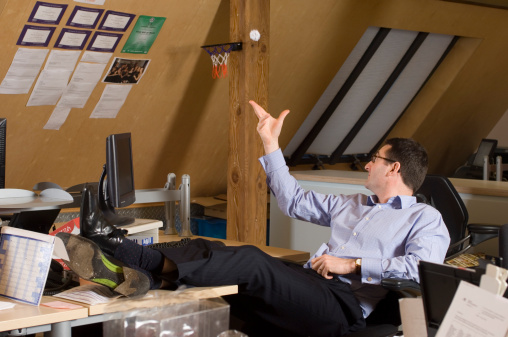By Simon Davies
Workers waste hours in the office, every day, replying to emails, daydreaming in meetings and chatting to colleagues, and that’s before you’ve even checked their Facebook accounts. According to research by ContentWatch, 61% of employees waste anything from 1 to 8 hours of work a day. That’s a lot of time and money down the drain, and its avoidable.
Research from Atlassian found three major culprits for time wasting in the office. Email, board meetings and ‘distractions’, i.e your colleagues. Here’s why that time is wasted and how you can fix the problem.
Social Chatting and Serviced Office Setups
A 2014 study by CareerBuilder found 42% of employers found gossip harmed productivity in the office. 24% found ‘noisy co-workers’ a problem. We all like a chat and a sociable office can really help productivity, raising morale and increasing team cohesion. But it’s a balancing act that many of us struggle to get right.
This can include business phone calls, as well as casual conversations and sociable chatter. Either way it can quickly escalate and interrupt others.
These kinds of noisy interruptions can particularly be a problem in serviced offices, shared by many smaller businesses, and in co-working spaces. Though for the latter, it can be more expected, with a more laid back vibe overall. In serviced offices, rental desk space can place small businesses very near to each other. Everyone could be very quiet and focused, or all talking and making business phone calls.
Innovative Solutions? Believe it or not, but you might be able to blame this one on your office layout. The jury is still out on the advantages and disadvantages of open plan offices. However, serviced office providers Easy Offices suggest that creating flexible working spaces can make a huge difference. Lighting, ventilation, and even the furniture all play a role in office productivity and morale.
Alternatively, taking regular 5 minute breaks to chat, exercise, and do non-work stuff can actually help freshen and focus your mind and reduce the temptation to natter. Email check in times can also become allowed interruption times, giving structure to when face-to-face talks happen.
If you’re sharing a space, such as in a serviced office, try to get space in the corner or organise with those in your shared space quiet times. Otherwise, get yourself some sound-blocking headphones.
Checking and Double-Checking Emails
Ah, emails. Nothing wastes time like the constant checking, writing and checking again of your emails. In fact, on average we receive 304 of them a week and the average employee checks theirs 36 times an hour. That’s more than once every two minutes.
But emails are necessity of office life and can’t be replaced as they offer a clear record of conversations and are accessible at times to suit both sides.
Innovative solutions? Strict check in times and folders. Set up to four points in the day when employees (and employers) check their emails and for 30min sessions. By setting aside dedicated time, you can train yourself to not think about catching that instant email reply, but saving it all up for one sprint.
You should also consider setting up folders for certain clients or internal teams. If you find yourself getting distracted by a busy inbox, or losing emails in starred lists, consider having your emails automatically filed into folders. This means you can check the right emails when you’re ready. Just remember to schedule times to look at all the sub-folders too!
You can also add plugins or delayed messaging tools, like Boomerang for Gmail, which allow you to schedule an email to send later. This will allow you to send all your emails at once, and avoid having to go back to your inbox to send an email later – which could cause you to fall back into checking emails again when you shouldn’t be.
Too Many Meetings With All the Wrong People
Atlassian also reported that employees attended an average of 62 meetings each month. Of those 62, half are considered wasted. That’s 31 hours wasted a month, just on meetings! 91% of us have admitted to daydreaming during meetings, suggesting that we’re either not engaging the right people or wasting their time and our resources.
According to an article published by Forbes, the pharmaceutical company, GlaxoSmithKline, found so much time was wasted on meetings they decided to adopt a ‘fit for purpose’ process. This meant only those involved at that particular phase of the process would attend the meeting, everyone else could read notes from the meeting afterwards.
With careful planning, you can include all the people actually necessary for conversations to have outcomes, leaving out the other people.
Innovative solutions? The truth is meetings will never truly go away. They’re one of office life’s constants and they can be helpful. Conference calling is one way to tackle this, meaning you can at least save having to leave the desk, but can still have a group conversation.
Alternatively, internal meetings can be made more efficient by having an agenda and sticking to it. Others set out one day a week specifically for meetings, freeing them up on other days.
If you want to catch people up, assign someone to send an email (at one of your scheduled check in times) to catch everyone up who wasn’t in the meeting but who could benefit from being in the loop. That way they can check in in their own time.
Simon Davies is a freelance journalist interested in marketing, tech and small business. Follow him at @SimonTheoDavies.







